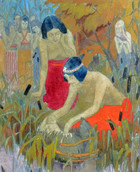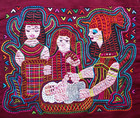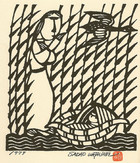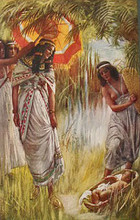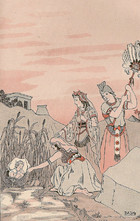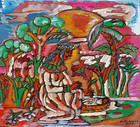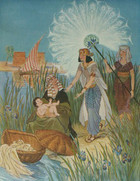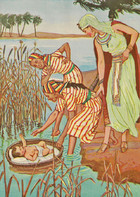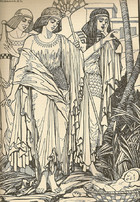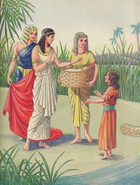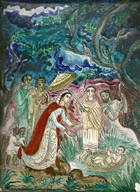The Rescue of Baby Moses
(Exodus 1:8-11, 14, 22, 2:1-10, NIV)
Then a new king, who did not know about Joseph, came to power in Egypt. “Look,” he said to his people, “The Israelites have become too numerous for us. Come, we must deal shrewdly with them or they will become even more numerous and, if war breaks out, will join our enemies, fight against us, and leave the country.”
So, they put slave masters over them to oppress them with forced labor. They made their lives bitter with hard labor in bricks and mortar and with all kinds of work in the fields; in all their hard labor the Egyptians used them ruthlessly.
Then Pharaoh gave this order to all his people: “Every boy [of the Israelites] that is born you must throw into the Nile, but let every girl live.”
Now a man of the house of Levi married a Levite woman, and she became pregnant and gave birth to a son. When she saw he was a fine child, she hid him for three months. But when she could hide him no longer, she got a papyrus basket for him and coated it with tar and pitch. Then she placed the child in it and put it among the reeds along the bank of the Nile. His sister stood at a distance to see what would happen to him.
Then Pharaoh’s daughter went down to the Nile to bathe, and her attendants were walking along the river bank. She saw the basket among the reeds and sent her slave girl to get it. She opened it and saw the baby. He has crying, and she felt sorry for him. “This is one of the Hebrew babies,” she said.
Then his sister asked Pharaoh’s daughter, “Shall I go and get one of the Hebrew women to nurse the baby for you?”
“Yes, go,” she answered. And the girl went and got the baby’s mother. Pharaoh’s daughter said to her, “Take this baby and nurse him for me, and I will pay you.”
So, the woman took the baby and nursed him. When the child grew older, she took him to Pharaoh’s daughter and he became her son. She named him Moses, saying, “I drew him out of the water.”
From The Holy Bible: New International Version[NIV] (New York Bible Society International: 1973)
